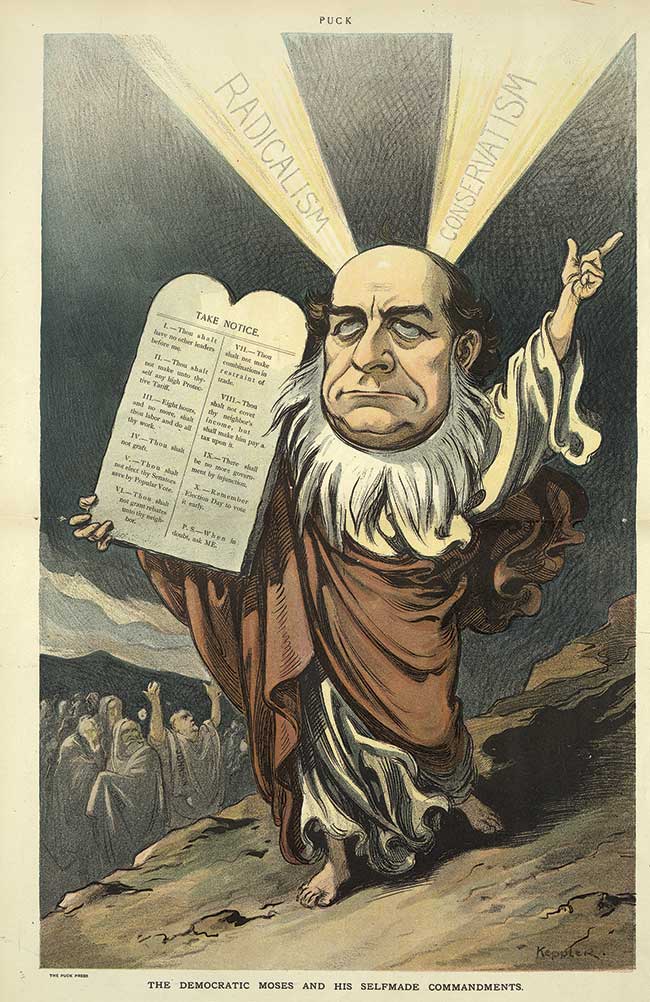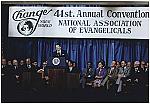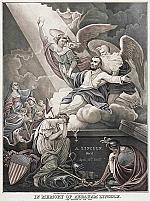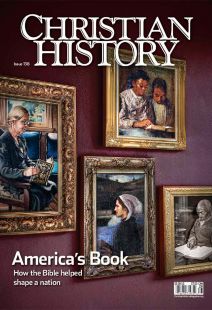Bible in America: Did you know?

[Keppler, Udo J. The Democratic Moses and his selfmade commandments. Puck, v. 60, no. 1542 (1906 September 19). Keppler & Schwarzmann / Library of Congress Prints and Photographs Division]
First Bibles in America
• The first English book published in North America was The Whole Booke of Psalmes Faithfully Translated into English Meter (1640), known as the Bay Psalm Book.
• The first Bible translation to appear in America was by Puritan pastor John Eliot, who translated the New Testament into an Algonquian dialect in 1661, followed by the Old Testament in 1663.
• An edition of Martin Luther’s German Bible, printed in 1743, became the first colonial translation published in a European language.
• Bibles were not printed in America in English until after the Revolution; it was illegal to print a Bible in the colonies as the British Crown held copyright. Robert Aitken printed the first complete King James Version in 1782, the only one ever authorized by Congress. Copies of his New Testament appeared as early as 1777. Pocket-sized, they were called the “Bible of the Revolution” because soldiers found them easy to carry around.
Here I find mine Ebenezer—on the map
Americans have named hundreds of towns after biblical places and people. Some include Canaan, Connecticut (Genesis 9:18); Zoar, Ohio (Genesis 13:10); Gilead, Nebraska (Genesis 31:21); Bethlehem, Pennsylvania (Genesis 35:19, Matthew 2:1, Luke 2:4); Goshen, Indiana (Genesis 45:10); Ephraim, Utah (Genesis 46:20); Jericho, Arkansas (Numbers 22:1); Ebenezer, Georgia (1 Samuel 4:1); Zion, Illinois (2 Samuel 5:7); Ruma, Illinois (2 Kings 23:36); Mount Tirzah, North Carolina (Joshua 12:24); Zela, West Virginia (Joshua 18:28); Nazareth, Texas (Matthew 2:23); Berea, Kentucky (Acts 17:10); and Smyrna, Georgia (Revelation 2:8). You will find about 60 Edens (Genesis 2:8), 50 Bethels (Genesis 12:8), and 95 Salems (Genesis 14:18). The most famous Salem, home of the 1692 witch trials, is in Massachusetts.
The Bible that quickly expired
Noah Webster (1758–1843), who had simplified some aspects of British spelling in his famous 1783 spelling book, produced a simplified, updated revision of the KJV in 1833. It replaced “Holy Ghost” with “Holy Spirit,” “why” with “wherefore,” “usury” with “interest,” and “whore” with “lewd woman.” It even rewrote whole sentences: “Why did I not give up the ghost when I came out of the belly?” (Job 3:11) became “Why did I not expire at the time of my birth?,” and Martha says to Jesus about Lazarus (John 11:39) “by this time his body is offensive” instead of “by this time he stinketh.” But Americans were not ready to give up the KJV, and Webster’s Bible sold so poorly that it is now one of the rarest Bibles ever printed in America.
Tales of the Christ
While the Bible appears in many well-known American books, some once popular are now forgotten. Among these is Julian: Or, Scenes in Judea (1841) by Unitarian minister William Ware, one of the first American novels where a fictional protagonist tells biblical stories. Lew Wallace (1827–1905) later used this idea in the more famous Ben-Hur: A Tale of the Christ (1880). Wallace was a lawyer, general in the Union army, governor of New Mexico, and ambassador to the Ottoman Empire. He claimed Christianity but never joined any church, and he never set out to be a professional author: he started writing because being a lawyer bored him.
The song for me
No one seems to know who wrote the famous chorus “The B-I-B-L-E.” It first appeared with no author or composer credited in a 1934 Evangelical Covenant Church hymnal, Bible Choruses and Songs. Americans have sung many hymns about the Bible, but the Good Book has climbed the secular charts too. In the nineteenth century, the most popular Bible-related song was “My Mother’s Bible” (1843) by George Morris; in the twentieth, artists recorded “The Bible Tells Me So” (1955) by Dale Evans three times. Pete Seeger’s “Turn! Turn! Turn!” (1959) climbed to #1 in 1965 when the Byrds recorded it—with a text almost entirely from Ecclesiastes 3:1–8. CH
By the editors
[Christian History originally published this article in Christian History Issue #138 in 2021]
Next articles
Bible in America: Letters to the editor
Readers respond to Christian History
our readers and editorsBible in America: Editor's Note
Life was saturated with references to God and to scriptural metaphors.
Jennifer Woodruff TaitSupport us
Christian History Institute (CHI) is a non-profit Pennsylvania corporation founded in 1982. Your donations support the continuation of this ministry
Donate






